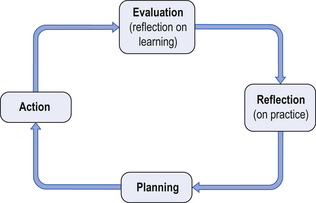6 This chapter is designed to develop an understanding of continuing professional development (CPD) and to consider the importance to pharmacists and pharmacy technicians of individual active engagement in an ongoing programme of CPD. CPD is related to, and indeed part of, clinical governance (see Ch. 9). Clinical governance is about both continuous quality improvement and being accountable for quality improvement. As such, CPD is an integral part of clinical governance and it involves all healthcare professionals. Those healthcare professionals working in the UK NHS will find there are specific requirements for clinical governance and CPD, which are mandatory. The Community Pharmacy Contract (England) with the NHS states a clear need for community pharmacists to be undertaking and maintaining CPD records within the clinical governance requirements. In addition to this in the UK, the Standards of conduct, ethics and performance of the GPhC places further obligations on pharmacists. Before any service is offered, whether to prescribers, patients or others, a pharmacist must ensure that whoever is delivering the service has a relevant level of competence, skill or knowledge in that area. CPD allows the pharmacist to provide evidence and demonstrate competence. The four stages of the cycle are shown in Figure 6.1 and involve: Reflection involves the individual spending time reflecting on current performance and how work is undertaken. The reflection time helps in identifying personal learning and development needs. Reflection involves thinking about how daily tasks are carried out, the areas in which the individual feels their knowledge or skills are weak or reflecting on events that have happened, which indicate a need to improve their knowledge or skills. Sometimes a particular situation or event will draw the attention of the pharmacist to a weakness in knowledge, ability or systems of work which, if not addressed, could cause further problems. This is called a critical incident (see Ch. 10). When reflecting, there are several questions which should be addressed:
Continuing professional development and revalidation
Introduction
What is continuing professional development?
 Continuing: this is about lifelong learning, an ongoing (or continuing) process regardless of the age of the pharmacist or the stage of their career
Continuing: this is about lifelong learning, an ongoing (or continuing) process regardless of the age of the pharmacist or the stage of their career
 Professional: this is focused on individual competence in a professional role, i.e. it is to do with the work of the pharmacist
Professional: this is focused on individual competence in a professional role, i.e. it is to do with the work of the pharmacist
 Development: this is about identifying and undertaking learning that improves the personal skills of the pharmacist to enhance patient care and career development, i.e. it changes for the better the work of the pharmacist.
Development: this is about identifying and undertaking learning that improves the personal skills of the pharmacist to enhance patient care and career development, i.e. it changes for the better the work of the pharmacist.
CPD cycle
Reflection on practice
 What knowledge gaps do I have when undertaking my current role?
What knowledge gaps do I have when undertaking my current role?
 What areas do I need to develop to further progress my career?
What areas do I need to develop to further progress my career?
 What have I done recently which I could improve next time?
What have I done recently which I could improve next time?
 What do I want to be able to do?
What do I want to be able to do?
 What extra skills can I offer my patients that would be of benefit to them?
What extra skills can I offer my patients that would be of benefit to them?
 What skills could I develop that would help deliver my organization goals more effectively?
What skills could I develop that would help deliver my organization goals more effectively?![]()
Stay updated, free articles. Join our Telegram channel

Full access? Get Clinical Tree


Continuing professional development and revalidation
Only gold members can continue reading. Log In or Register to continue









